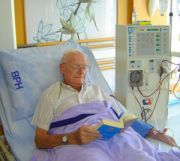Article
Can End-Stage Renal Disease Patients Expect to Recover?
Author(s):
Although less than 2.4% of end-stage renal disease patients are expected to experience renal recovery, a research team found sustained recovery occurs more often than previously believed.

For most patients on long-term hemodialysis, disease progression to end-stage renal disease (ESRD) is irreversible, as less than 2.4% of patients are expected to experience renal recovery.
Members of the Fistula First Breakthrough Initiative Data Committee — which was established to examine the high rate of arteriovenous fistula in hemodialysis patients — have used their clinical findings published in the December 2013 issue of PLOS One to provide more accurate data on renal recovery in ESRD.
The authors enrolled approximately 194,000 patients who began hemodialysis in 2008 or 2009. They identified specific cases of ESRD in that cohort by tracing medical evidence forms submitted by dialysis facilities, and then cross-referencing the forms with patient record updates and a US Centers for Medicare & Medicaid Services (CMS) registry through the end of December 2010. Patients who had temporary recovery defined as recovery followed by a return to dialysis within the follow-up period were excluded from the study results.
Among Medicare ESRD patients, more than 5% experienced sustained renal recovery, which was considerably higher than previously reported rates. In addition, most patients recovered within 2 months post-incident dialysis.
The patients with renal failure secondary to acute kidney injury — who comprised approximately one-third of those who recovered in the study — were more likely to recover and were markedly less likely than true long-term ESRD patients to have permanent vascular accesses in place at incident hemodialysis, which was associated with very low rates of recovery.
Non-white patients and those with pre-existing kidney disease appeared to have significantly lower rates of renal recovery; thus, an acute insult superimposed on chronic disease often reduced hope of sustained recovery.
The rates of renal recovery varied geographically, as fewer than 2.5% of patients in Delaware recovered, while 9.6% of patients in Kansas did. Overall, the researchers found recovery is more likely than previously believed, although it is still rare.





